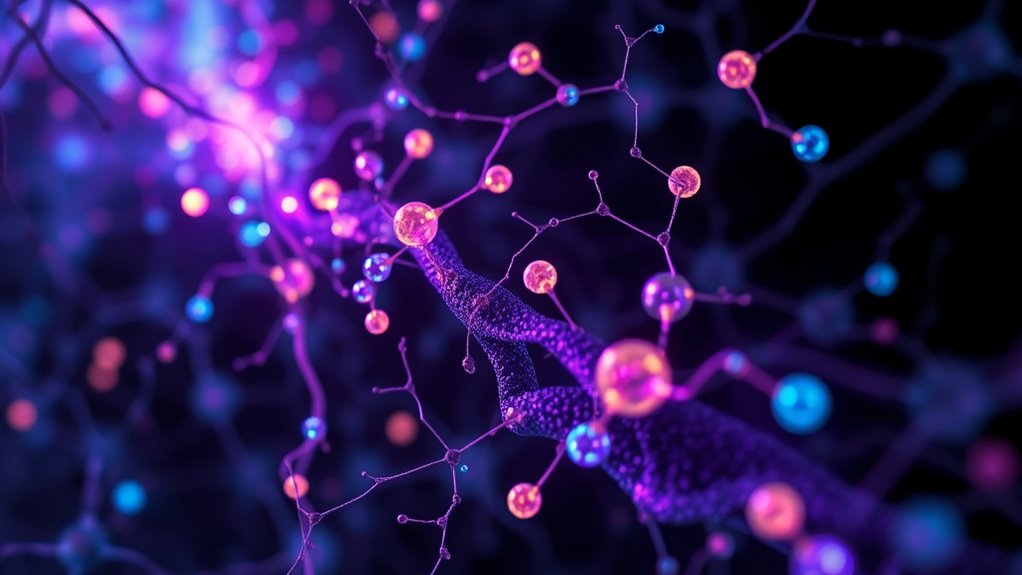Your sense of smell connects directly to brain regions like the amygdala and hippocampus, bypassing the thalamus, which allows scents to evoke vivid memories and strong emotions instantly. Neural pathways activate these emotional centers quickly, often triggering feelings, nostalgia, or memories from years ago. Repeated scent exposure can strengthen these memories, while cultural and personal experiences shape your olfactory associations. To understand how this fascinating connection influences your emotions and memory, explore the insights that follow.
Key Takeaways
- Odor signals bypass the thalamus, directly activating limbic regions like the amygdala and hippocampus, facilitating rapid emotional and memory responses.
- Neural oscillations, especially gamma waves, synchronize activity between odor-processing and memory centers to reconstruct detailed scent-related memories.
- The hippocampus links specific scents to experiences, enabling vivid, long-lasting odor-linked memories through neural pathways involving the olfactory bulb and limbic system.
- Cultural, regional, and age-related factors influence how odors evoke memories, with familiar scents triggering nostalgia and emotional responses.
- Odor-linked memories are utilized therapeutically to enhance memory retrieval, support emotional healing, and reduce trauma symptoms via scent cues.
The Pathway of Smell in the Brain

When you breathe in, odor molecules travel through your nasal passages and bind to specialized receptors on sensory nerve cells. These receptors send signals to the olfactory bulb, located just above your nasal cavity. From there, the information is transmitted via the olfactory nerve to various parts of your brain. Unlike other senses, smell bypasses the thalamus and directly reaches areas involved in emotion and memory, such as the amygdala and hippocampus. This direct route allows scents to evoke vivid memories quickly. Your brain processes and interprets these signals, forming perceptions of different odors. This pathway’s efficiency explains why certain smells can instantly trigger strong emotional responses or memories, highlighting the unique neural connection between smell and your brain’s emotional centers.
The Unique Connection Between Olfaction and the Limbic System

The direct connection between the olfactory system and the limbic region of the brain explains why smells often evoke such powerful emotional responses. When you smell something familiar, it bypasses the usual processing centers and activates the limbic system directly, linking odors to feelings, memories, and instincts. This close relationship means that a scent can instantly transport you back to a childhood moment or evoke deep feelings of comfort or nostalgia. You might experience:
- Memories flooding back unexpectedly
- Feelings of joy or sadness triggered instantly
- A sense of longing or familiarity
- Emotional responses that seem more intense than other senses
- An almost visceral connection to past experiences
This deep link is why smells are uniquely emotional, shaping your perceptions and memories on a subconscious level. Additionally, the high sensitivity of the olfactory system contributes to its powerful influence on emotional memory.
How Odors Trigger Emotional Responses

Odors have an immediate power to evoke strong emotional responses because they directly activate the limbic system, bypassing conscious thought. When you encounter a scent, it quickly triggers emotional centers like the amygdala, which processes fear, pleasure, and other feelings. This direct connection explains why certain smells can instantly make you feel happy, nostalgic, or anxious. Unlike other senses, olfaction doesn’t need to go through conscious filtering, so the emotional impact is often intense and immediate. For example, the smell of baking bread might evoke warmth and comfort, while a particular perfume could bring back vivid memories. These emotional responses are rooted in the brain’s wiring, where odors serve as powerful cues for feelings tied to your past experiences. Additionally, olfactory pathways have a unique connection to memory centers in the brain, further amplifying the emotional impact of certain scents.
The Role of the Hippocampus in Odor-Related Memory Formation

Your sense of smell doesn’t just trigger immediate feelings; it also plays a key role in forming lasting memories, thanks to the hippocampus. This brain region helps link odors to specific experiences, creating vivid recollections. When you encounter a scent, the hippocampus activates, associating that smell with emotions, places, or people. This connection makes scent-based memories particularly powerful and enduring. Additionally, advances in neuroscience explore how intelligent tutoring systems could leverage odor cues to enhance personalized learning experiences. Recall childhood moments triggered by a familiar smell. Feel a rush of nostalgia when smelling a favorite dish. Experience emotional intensity linked to specific odors. Remember treasured relationships through scent cues. Relive significant events vividly through smell associations. The hippocampus’s role guarantees that odors become more than fleeting sensations—they become gateways to meaningful memories.
Neural Mechanisms Underlying Odor-Driven Recollection

When a familiar scent triggers a memory, a complex network of neural processes springs into action. Your olfactory receptors detect the scent and send signals directly to the olfactory bulb, which quickly relays information to the amygdala and hippocampus. These regions are essential for emotional and contextual aspects of memory retrieval. The piriform cortex also processes odor information and communicates with the orbitofrontal cortex, integrating sensory details with stored memories. This rapid, direct pathway bypasses typical sensory routes, allowing odors to evoke vivid recollections instantly. Neural oscillations, like gamma waves, synchronize activity across these areas, facilitating the reconstruction of detailed memories. This intricate interplay of neural circuits underpins how odors can powerfully evoke specific, emotionally charged memories. Additionally, the neural pathways involved in odor processing are highly specialized, enabling the swift connection between scent detection and memory retrieval.
Differences Between Olfactory and Other Sensory Memories

Unlike other sensory memories that often rely on higher-order processing and multiple synaptic steps, olfactory memories are unique in their direct neural pathways. This direct connection to the limbic system, especially the amygdala and hippocampus, makes smells more emotionally charged and vividly recalled. You might notice that a familiar scent instantly transports you to a childhood moment or a loved one’s embrace. This contrasts with visual or auditory memories, which typically involve more complex processing. The emotional power of odors can deeply influence your mood and behavior.
- Feelings of nostalgia flooding back unexpectedly
- Sudden, intense emotional reactions to a scent
- Memories that seem more detailed and visceral
- Immediate emotional responses without conscious effort
- A strong sense of personal connection to the smell
The Impact of Repeated Exposure to Scents on Memory Strength

Repeated exposure to a scent can considerably strengthen your memory of it over time. Each encounter reinforces the neural pathways associated with that odor, making it easier to recall later. This process, called familiarity enhancement, helps your brain form more durable connections between the scent and its context. When you repeatedly smell a specific aroma, your olfactory system becomes more efficient at recognizing it, leading to quicker and clearer memories. This effect is especially strong if exposure occurs in consistent situations, anchoring the scent to particular experiences. Over time, your brain associates the repeated scent with specific emotions or memories, making it more vivid and accessible. Regular exposure not only improves recall but also deepens the emotional resonance tied to that scent. Additionally, consistent scent exposure can influence your emotional state, further strengthening the memory association through emotional conditioning.
The Influence of Age and Experience on Odor Memory

As you age, your ability to remember odors often changes, influenced by both biological and experiential factors. Your olfactory system naturally declines over time, making it harder to recall scents you once knew well. Meanwhile, your experiences shape how you associate odors with memories, strengthening some and weakening others. You might notice that familiar smells from childhood evoke deep nostalgia, while unfamiliar scents fade quickly. This interplay affects your emotional responses and memory accuracy. Additionally, monitoring credit card statements can help detect early signs of fraud that might impact your financial well-being.
Aging alters how we remember odors, blending biological decline with changing personal experiences.
- Cherished memories triggered by a familiar aroma
- Difficulties recalling scents from years ago
- Emotional reactions intensified by scent associations
- Loss of sensitivity impacting daily life
- New experiences creating fresh olfactory memories
How Cultural Factors Shape Olfactory Associations

Your cultural background influences how you perceive and associate different odors, as certain scents carry specific meanings. Regional preferences shape which smells you find appealing or familiar, guiding your olfactory experiences. Traditions and customs also reinforce these associations, making scent memories deeply personal and culturally rooted. Additionally, individual differences in Cultural Intelligence can affect how effectively you navigate and interpret these olfactory cues across diverse cultural contexts.
Cultural Scents and Meanings
Cultural factors profoundly influence how you perceive and interpret scents, shaping the meanings you attach to specific odors. Your cultural background can turn a simple aroma into a powerful symbol or memory. For example, the smell of incense might evoke serenity in one culture but be associated with mourning in another. Cultural scents can evoke deep emotions and even influence your behavior. Additionally, the significance of certain smells can be enhanced by indoor air quality improvements, which can amplify or diminish olfactory experiences.
Regional Olfactory Preferences
Regional olfactory preferences are shaped by the unique cultural influences and environmental factors that define each community. These preferences influence which scents are familiar, appreciated, or avoided. For example, regions with coffee cultivation may develop strong associations with roasted aromas, while coastal areas often favor salty or oceanic smells. Cultural practices, climate, and local cuisine all impact scent preferences, creating distinct olfactory identities. To illustrate, consider the following factors:
| Factor | Impact on Preferences | Examples |
|---|---|---|
| Climate | Affects scent availability and popularity | Citrus in warm regions |
| Agriculture | Shapes local scent familiarity | Lavender in Provence |
| Cuisine | Influences preferred flavors and smells | Spices in India |
| Cultural Norms | Define scent acceptance and symbolism | Perfumes, sacred scents |
Additionally, the user control over data collection practices plays a role in shaping regional scent landscapes, as communities may have different norms regarding scent-related products and their use. These elements combine to form regional scent landscapes, guiding individual olfactory experiences.
Traditions Shaping Associations
Regional olfactory preferences are deeply intertwined with longstanding traditions that influence how scents are perceived and valued. These cultural practices shape your emotional responses and memories associated with specific odors. For example, certain spices, herbs, or floral fragrances evoke comfort, nostalgia, or even spirituality within particular communities. Your cultural background guides your reactions, making some scents feel like home while others feel unfamiliar or even intrusive.
- Reminding you of cherished family gatherings
- Evoking memories of sacred rituals
- Connecting you to your heritage
- Stirring feelings of belonging or longing
- Reinforcing cultural identities
These traditions create powerful bonds between smells and your personal history, influencing how you interpret and respond to odors every day. Your scent preferences become a reflection of your cultural story.
Potential Therapeutic Uses of Odor-Linked Memory Recall

You can use odors to improve memory retrieval and help people reconnect with forgotten experiences. These scents also show promise in reducing PTSD symptoms by safely triggering positive memories. Additionally, odor-linked recall may stimulate neural plasticity, supporting brain recovery and adaptation.
Enhancing Memory Retrieval
Because odors are closely linked to memory retrieval, researchers are exploring how scent cues can be harnessed to improve therapeutic outcomes. You can use specific odors to trigger vivid memories, helping you access forgotten or difficult-to-recall information. This approach has the potential to boost learning, enhance cognitive therapy, and support aging individuals facing memory decline. By pairing scents with important experiences, you may strengthen neural pathways, making retrieval easier during critical moments. Imagine walking into a room and instantly recalling a loved one’s advice or a joyful event. This technique can:
- Reignite long-lost memories
- Improve focus during learning
- Support emotional healing
- Aid in cognitive rehabilitation
- Foster a sense of connection and comfort
Harnessing scent cues offers a promising way to unblock your memory’s full potential.
Alleviating PTSD Symptoms
Odor-linked memory recall offers a promising avenue for alleviating PTSD symptoms by helping you access and process traumatic memories in a controlled environment. By using specific scents associated with your experiences, therapists can guide you to confront distressing memories safely. This approach allows you to reframe and diminish the emotional impact of trauma, reducing anxiety and avoidance behaviors. The olfactory system’s direct connection to the brain’s memory centers makes odors powerful tools for triggering and modulating emotional responses. With careful guidance, you can gradually build resilience and gain a sense of control over your memories. This method offers a non-invasive, accessible way to target the underlying neural pathways involved in PTSD, paving the way for more effective and personalized treatments.
Stimulating Neural Plasticity
Stimulating neural plasticity is a promising frontier in enhancing therapeutic approaches for trauma and mental health conditions. By activating odor-linked memories, you can encourage your brain to rewire itself, fostering healing and resilience. This process helps break negative thought patterns and strengthens adaptive responses. Imagine reconnecting with positive memories triggered by familiar scents, creating new neural pathways that support recovery. You might experience:
- A renewed sense of hope and control
- Reduced anxiety and fear responses
- Enhanced emotional resilience
- Accelerated recovery from trauma
- A deeper connection to positive experiences
Harnessing odors to stimulate plasticity offers a powerful, non-invasive tool to transform your mental health journey and disclosenew pathways toward well-being.
Frequently Asked Questions
Can Odors Influence Decision-Making and Behavior Beyond Memory?
Odors can indeed influence your decision-making and behavior beyond just triggering memories. When you smell something, it activates brain regions involved in emotions and instincts, like the amygdala and hypothalamus. This can affect your mood, motivation, and choices without you even realizing it. So, next time you encounter a scent, consider how it might subtly steer your actions, feelings, or preferences without your conscious awareness.
How Do Genetic Differences Affect Individual Odor Memory Capacity?
Your genetic differences play a significant role in how well you remember odors. Certain genes influence the structure and function of olfactory receptors, affecting your sensitivity and memory of scents. If you have specific genetic variations, you might find it easier or harder to recall particular odors. These genetic factors shape your olfactory system’s efficiency, directly impacting your odor memory capacity and how vividly you can remember smells.
Are There Specific Scents Linked to Childhood Memories Universally?
You might wonder if certain scents trigger childhood memories for everyone. While some smells like vanilla or freshly cut grass often evoke nostalgia, universal links are rare because personal experiences shape our associations. Your unique memories color how scents connect to your past. Despite common favorites, individual differences mean that what vividly recalls your childhood may not do the same for someone else.
What Role Do Sleep and Dreams Play in Odor-Related Memory Consolidation?
Sleep and dreams are vital for consolidating odor-related memories. When you sleep, your brain processes and strengthens these associations, making them more vivid and accessible. During dreams, especially REM sleep, your mind reactivates scent memories, reinforcing their emotional and contextual ties. This process helps you retain sensory experiences tied to odors, allowing you to recall them more easily upon waking or encountering similar scents again.
Can Artificial Odors Be Used to Enhance or Modify Memory Recall?
You might think about harnessing scents to subtly influence your memories. Artificial odors can potentially enhance or modify recall by tapping into your brain’s natural associations. When you expose yourself to familiar or deliberately chosen smells during learning or recall, you may strengthen connections or create new links. While promising, this approach still needs more research, but it offers a fascinating way to gently shape your memories through scent.
Conclusion
Imagine a single scent as a key releasing memories long buried, like a forgotten song resurfacing unexpectedly. Research shows odors can evoke vivid emotions and distant pasts, revealing how deeply scent weaves into your brain’s fabric. Just as a familiar aroma can transport you to a childhood moment, understanding this connection offers pathways for healing and discovery. Embrace the power of smell—it’s your personal bridge to memories waiting to be rediscovered.









